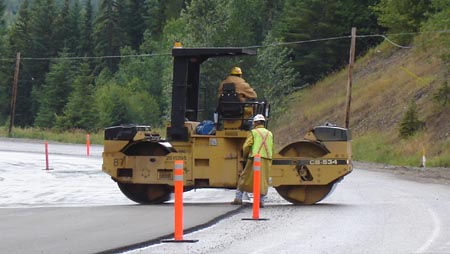Ambient Air Study Not Yet Ready to Go
By 250 News

Paving season is nearly here, but the plan to monitor air in the Nechako Valley isn’t ready to go
Plans to have an ambient air quality study for the Nechako Valley are still in the works, but it is taking a little longer than had been hoped.
Earlier this year, the Ministry of the Environment requested that Pittman Asphalt, Columbia Bitulithic, and the remaining members of the Aggregate Association , all contribute to the cost of the study.
While all have indicated they are committed to making a financial contribution, the details are still being worked out. There is also a request for some Provincial funding.
The full cost of the two year study is about $90 thousand dollars, it will cover three areas
1. Segregate pollution sources between industrial (gravel, asphalt cement operations) and residential (woodstove and fireplace) contributions by wind direction
2. Compile baseline data on the effects of the previously unmonitored emission sources (asphalt plants and gravel operations) in a sensitive Airshed, and
3. Compare ambient levels in the North Nechako Valley with the long term data on Pm 2.5 collected at the Plaza 400 site downtown.
It had been hoped the equipment would be up and running by May 1st. That has since been pushed back to June 1st as there are still financial matters that have to be resolved. If the funding were granted today, Mellissa Winfield –Lesk of the Ministry of Environment’s Prince George office says the equipment could be in place and operating for most of the 2007 paving season.
If the full funding is not received, it is possible the scope of the study could be scaled back, it is also possible the City of Prince George may be asked to make a one time contribution to help the project get off the ground.
The air quality issues hit a new level of concern last year when there was increased paving activity. This year, the Ministry has already met with the asphalt producers and gone over a detailed list of expectations. That list includes an expectation for both Pittman and Columbia Bitulithic that:
"In spite of the Asphalt Plant Regulation, if any stack test fails any parameter, the company must notify the regional Environmental Protection office immediately and must cease production immediately". That expectation concludes with saying the company will only be allowed to resume production "once stack monitoring results show that emissions do not exceed the concentration limits identified in Schedule B of the Asphalt Plant Regulation."
Previous Story - Next Story
Return to Home










Until that is solved, it is evident that no one in the position of responsibility really cares.
Just look at Mr. Sutherland recent announcements in the media. The second phase of the management plan is merely waiting for the third phase to begin. The first phase took almost a decade and really had no outcome other than being repeatedly told that the problem is fireplaces, backyard burning and road dust. Nothing very meaningful.
The cost of this is the pay raises the area MLAs wish to give themselves. Not only that, but the government is not even willing to pay for it. They are expecting the CIOty to pay for it if industry cannot agree to pay for it.
Waht is the holdup? That is the real story. What are the "financial matters that have to be resolved."? Let's idetnify who does not want to pay!!!